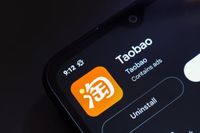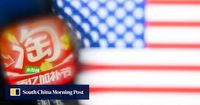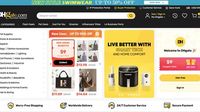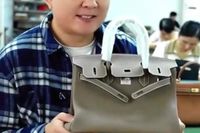In a surprising twist amid ongoing trade tensions, the Chinese e-commerce platform DHgate has soared to the top of the Apple App Store, reflecting a shift in consumer behavior as U.S. shoppers seek affordable alternatives to luxury goods. As of April 17, 2025, DHgate has become the No. 2 free iPhone app in the United States, driven by fears surrounding tariffs on Chinese imports. This surge is not isolated; another Chinese app, Taobao, has also made significant gains, entering the Top 5 of the App Store.
The recent popularity of DHgate and Taobao can be traced back to a wave of TikTok videos that have circulated among consumers. These videos from Chinese manufacturers have shed light on the luxury goods market, revealing that many high-end products are initially produced in China before being shipped to their respective countries for branding. Consumers have taken notice, with many influencers promoting these apps as a means to purchase directly from manufacturers, thereby avoiding the steep markups associated with luxury brands.
Data from app intelligence provider Appfigures indicates that Taobao saw its estimated downloads soar to approximately 185,000 in April, marking a staggering 514% increase from just 30,000 downloads in the same month last year. This uptick in popularity has been particularly pronounced over the past weekend, with installs jumping 5.7 times between April 11 and 12, 2025. Taobao's ranking on the iOS App Store rose dramatically, from No. 49 among shopping apps to No. 2, surpassing established competitors like Walmart, Amazon, Shein, and Temu.
On April 12, 2025, Taobao entered the Top Overall ranks on the iOS App Store at No. 461. By April 13, it had climbed to No. 188, and by the following Thursday, it reached No. 5. This rapid ascent has been mirrored by DHgate, which has also seen its downloads surge, climbing to second place on the free app charts, just behind OpenAI's ChatGPT.
The backdrop for this phenomenon is the ongoing U.S.-China trade war, which has resulted in tariffs of up to 145% on Chinese exports to the U.S. Conversely, American goods shipped to China face retaliatory duties of 125%. This escalating conflict has driven many consumers to seek ways to bypass traditional retail channels and purchase directly from Chinese suppliers.
TikTok has emerged as a pivotal platform in this shift, with creators sharing insights and tutorials on how to navigate these apps. One popular TikTok channel, Sen Bag, highlights handcrafted leather handbags that claim to match the quality of high-end designer brands like Hermès. In one of their videos, they assert, “A Birkin bag at a boutique will cost $38,000. But the real cost out of the factory?”
Sen Bag details that the production cost for a Birkin-style bag is approximately $450 for the leather and $25 for stitching and assembly. This stark contrast in pricing has resonated with consumers looking for luxury-style goods at a fraction of the retail price. Another TikToker, @lunasourcingchina, claims that popular yoga wear brand Lululemon sources some of its products from Chinese manufacturers, further demonstrating the appeal of these apps.
While the allure of purchasing directly from manufacturers can be enticing, experts caution consumers to proceed with care. The quality of products can vary significantly, and many items may not be genuine. As one commenter pointed out, “I don’t think most of these people realize that these products are bootleg. They’re not the actual name brands.” Supply chain experts are also warning that Chinese factories may be nearing their limits in terms of price reductions, indicating that consumers may not always find the best deals.
Moreover, Taobao's recent success is not limited to the U.S. The app has surged in popularity across 16 countries, with overseas downloads reaching 326,000 on April 15, 2025, a remarkable 222% increase from the previous Sunday. In North America and Europe, downloads skyrocketed by 483% and 439%, respectively, highlighting the app's global appeal.
As of April 16, 2025, Taobao had climbed to the second spot in the U.S. Apple App Store and topped the download charts in France, showcasing its growing influence in international markets. This sudden spike in interest comes at a time when consumers are increasingly looking for ways to save money as prices rise due to tariffs.
In the midst of this trend, Alibaba’s Taobao has jumped to fifth place from 47th on the Apple App Store and to third place from 144th among shopping apps on Google Play within a matter of days. According to Sensor Tower, Taobao has been downloaded 2 million times globally in the last 30 days, a testament to its growing user base.
As the U.S.-China trade war continues to shape consumer behavior, it remains to be seen how long this trend will last. For now, however, apps like DHgate and Taobao are capitalizing on the demand for affordable luxury goods, providing consumers with a new avenue for shopping that bypasses traditional retail channels.
While the shift towards these Chinese e-commerce platforms may offer immediate savings, shoppers are reminded to remain vigilant. As the saying goes, “buyer beware”—the distinction between legitimate surplus and counterfeit goods can be challenging to navigate. With the landscape of online shopping evolving rapidly, consumers are left to weigh the benefits of direct purchasing against the potential risks.










